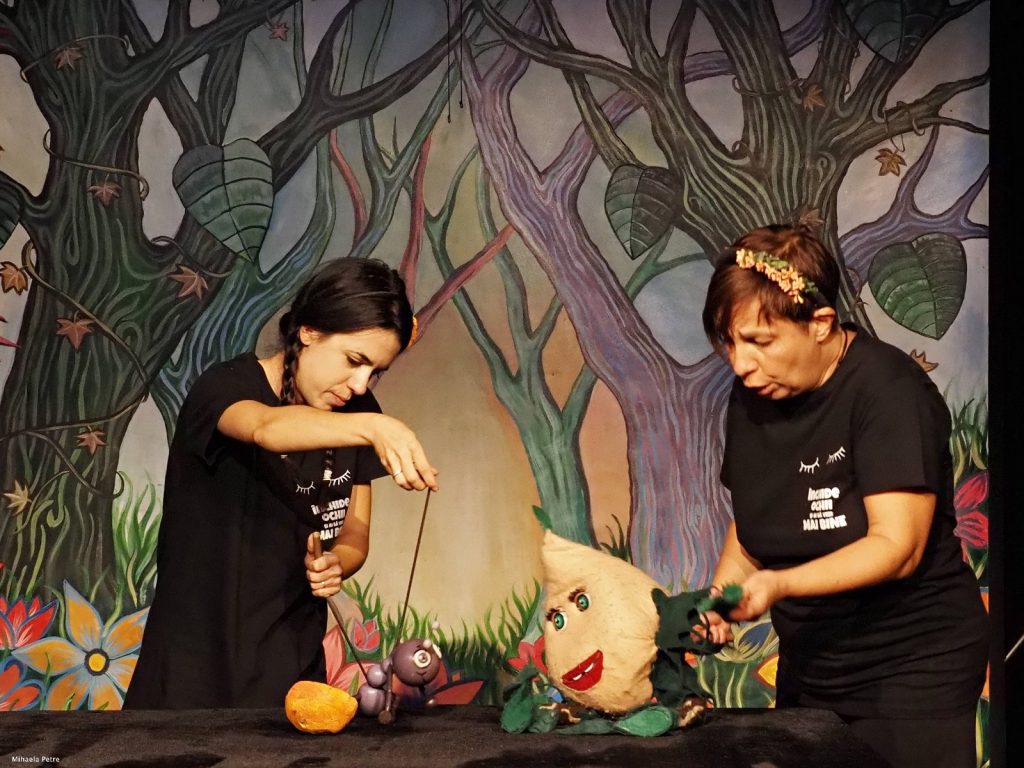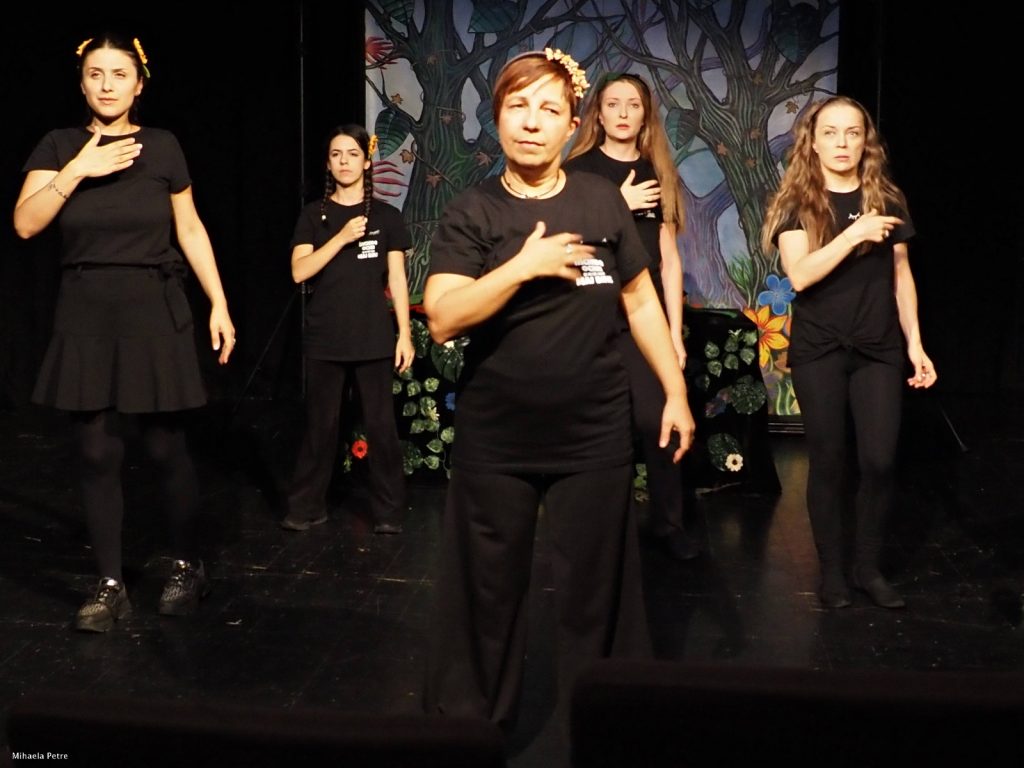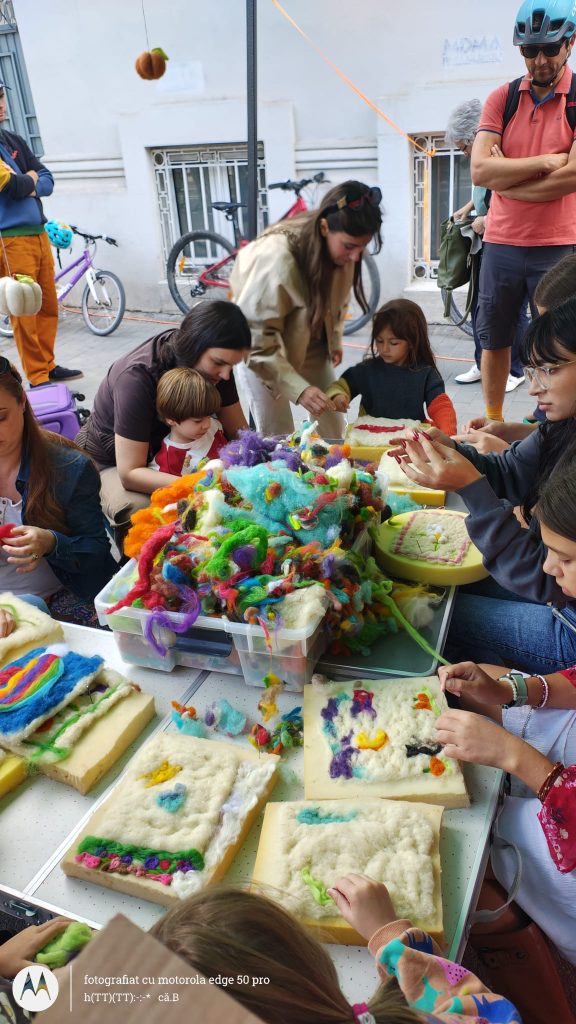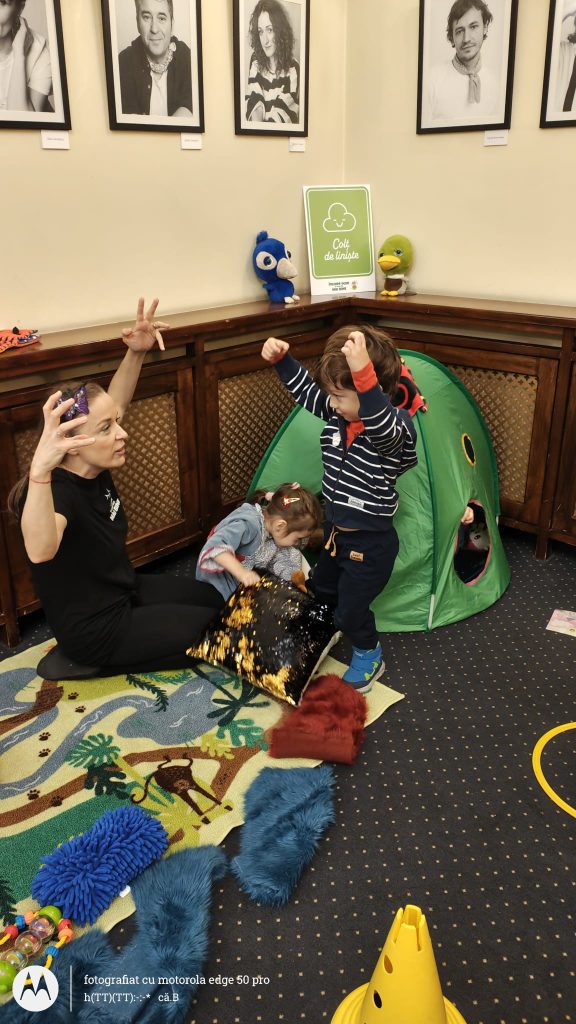Discover the story of Oana Popa – founder of “Școala de Joacă”, pioneer of accessible theater, and advocate of education through play and art. A life dedicated to children and inclusion through culture.
Oana Popa is an entrepreneur and teacher. But above all… she is one of the few people who have managed to keep their childlike soul alive. She has worked in radio, television, and theater, being the first in Romania to create a play dedicated to all children with disabilities. Yet, her most cherished experiences are those spent with children at “Școala de joacă” (The Play School) and in other inclusive projects she leads, as she is a pioneer in making theater accessible in Romania.
That’s precisely why she dedicates her time and energy to children, teaching them meaningful and valuable things for their development in a more engaging way than traditional school allows. For the past nine years, she has left Bucharest for the countryside.
Why? To be closer to the intrinsic values of her homeland.
And not only that.
Awards over the years:
- Best Female Radio Voice – 3rd Place
CNA [1995]
Declared the 3rd best female radio voice in Romania at that time. - Award for the Best Non-formal Education Project
VIP Magazine [2016]
For the “Școala de joacă” project. - Cariere Magazine Award (2016)
For the best non-formal education project, “Școala de joacă.” - Green Woman
Romanian Ecological Initiative [2020]- For the best community mobilization on social media – “Școala de joacă”
- For the best adaptation of a live educational project to the online system
- For the most creative form of communication for children during a crisis
- UCMR Award (2022)
- For the most beautiful soundtrack in a children’s performance (“Close Your Eyes and You’ll See Better” – music by Iulian Vrabete).
- Social Impact Award – Civil Society Gala 2023
- City Council Draft Resolution (2024)
Regarding the supplementary funding of cultural institutions to create accessible projects (for the first time in history). - Special Award for Social Impact and Inclusion – Top Child Performance 2024
- “The Best Creative Personality” – Di_Ploma Awards Gala Open Minds 2025
Oana is a devoted artist and journalist, being the first child’s voice on independent radio and one of the founding members of Romania’s first independent radio station, Unifan – Uniplus Radio (1990). At 18, she was already leading the Cluj branch of the radio station as program director.
She also has extensive experience as a television producer, working as director and co-director on Valeriu Lazarov’s shows (Ciao Darwin, Surprize, surprize, Ploaia de stele, Ploaia steluțelor, Genialii, Babilonia), as well as Romania’s first game show, Jocurile de la Saint Tropez, and various children’s programs (Next Star – Antena 1, Feriți-vă de măgăruș – TVR, Tip Top Mini Top, Kiki Riky, Miky – TVR).
As the founder of Școala de Joacă and president of the Grigore Popa Personal Development Association, Oana created Romania’s first theater performance fully adapted for people with disabilities, titled “Close Your Eyes and You’ll See Better”, and she continues to make concerts accessible together with her colleague Lavinia Chițu (sign language interpreter). Through her projects, she promotes social inclusion through culture and education through art, play, and craftsmanship, inspiring communities to rediscover the magic of theater and play.
C&B: How would you describe yourself in one sentence to make those who don’t know you curious?
Oana Popa: I like to say that I’m here on Earth as long as I can do something for those around me. When I can no longer give, it means it’s time for me to go.
C&B: If we were to look at the narrative thread of your career or business, what key moments have defined you?
Oana Popa: I believe that in life, we are defined by the encounters we have, and none of them are accidental. First of all, I was lucky to have very smart, free-spirited parents – sort of hippie souls. That gave me my start in life. Then there was my father, Grigore Popa, director and founder of the student theater Podul (Romania’s first independent theater in 1967), who was also Liviu Ciulei’s assistant director.
That doesn’t mean I ever had any “connections” to get ahead. Quite the opposite. The fact that I was allowed to “hit my head against the wall” was very formative. It developed my entrepreneurial spirit since I was encouraged from an early age to earn my own living. Meeting Liviu Ciulei at the age of six sparked my desire to be on stage. I had just moved to Bucharest (I was born and raised in Cluj), and everything felt magical, especially because Mr. Ciulei was such a warm person. That’s when I first started flirting with theater. My father didn’t approve at all – but too late!
Then came my journey in private radio from the age of 13 (as a founding member of UNIFUN/UNIPLUS Radio, then Europa FM, from 1990–2001). I was a pioneer of free speech in a still-censored Romania. That was another defining moment for me as a future communicator and media professional. I learned the meaning of teamwork and responsibility – that freedom of speech is not just a privilege but a tremendous responsibility.
Later, my meeting with Valeriu Lazarov was another turning point. I worked with him for 12 years, learning discipline and how to manage large teams. Working with film directors also shaped me profoundly – each of them added a brick to the person I am today.
C&B: What were the main challenges you faced in developing the association?
Oana Popa: First of all, the lack of financial resources. Despite all the fundraising campaigns, companies no longer invest in education or culture. There’s nothing commercial in it. Unfortunately, in Romania, what sells is sickness and death. Only people on social media still mobilize, but even so, it’s impossible to raise enough money to cover all the needs we’d like to address—especially when it comes to people with disabilities. That’s the main issue for any NGO.
Then there’s the geopolitical situation that affects us all, whether we like it or not. Over time, I’ve also struggled with the lack of a permanent team for fundraising, communication, or strategy. I rely only on my stage colleagues, who, like me, aren’t trained for those things. So, I try to do as much as I can on my own. On stage, though, I have an amazing team.


Credit photo Mihaela Petre
C&B: Is there a dream or ambition that has always guided you, regardless of obstacles?
Oana Popa: Yes—to do as much good as possible. To give children back their childhood, which has been stolen by technology. To turn my performances and events into a kind of therapy for children with disabilities—and not just them. We “normal” adults also need therapy through theater and music. That’s what I’ve been focusing on lately. Because if a child with disabilities feels well, then a typical child will definitely feel well too. The same applies to adults. An accessible environment for people with disabilities means a safe, friendly environment for everyone.
I created Școala de Joacă for this very reason—to stop adults from stealing childhood from children. I came up with Caravana de Joacă, a traveling play caravan where I visit communities and play classic childhood games with hundreds or thousands of children and parents. It’s fascinating to see how much we all need play nowadays.
“Play Together” is a project dedicated to children with disabilities—but not only them. Before the pandemic, children with disabilities came once a week to Școala de Joacă and played alongside typical children, without adult intervention. We proved that the most effective therapy is to treat them normally—to let them play and feel loved and accepted. It’s a win-win therapy: children with disabilities feel accepted, while typical children learn acceptance.
The pandemic shut down that project. But three years ago, Unicredit Romania helped us buy an abandoned plot of land on the Ialomița River in Pucioasa. We want to build an inclusive park on 2,000 square meters—a safe, nonjudgmental space where children with and without disabilities can play together, while parents can relax. We’re currently in the development stage but facing all kinds of obstacles and need help. Unicredit’s gift ran out, so now we rely on volunteers and companies willing to actively participate in building this dream place.
In 2021, I created Romania’s first and only theater performance accessible to nine types of disabilities simultaneously: “Close Your Eyes and You’ll See Better”, an adaptation of “Povestea seminței” by Dumitru Radu Popa. The play is performed at the Comedy Theater in Bucharest, and we dream of going on tour—10 big cities, 10 small towns, and the diaspora. What’s stopping us? Lack of funding and sponsorship.
In four years, we’ve brought joy to over 8,000 children with disabilities and their families. I’m lucky to have my colleague Lavinia Chițu on the team—the only interpreter in Romania who can translate music for the deaf. So, I fulfilled another dream: to bring music into the world of silence.
I like breaking barriers—that’s what my dreams are made of. To turn the world upside down and make it a better place.
C&B: How did you look at the beginning of your journey, and how do you feel you’ve transformed since then?
Oana Popa: Ahahaha! I was scared and somewhat helpless. I came after 25 years in mass media, as a producer managing large teams, thinking I didn’t know how to do anything else. I knew what I wanted to do for children, but I didn’t have the means—or the courage. My friend and therapist, Mirela Zivari, was the one who pushed me to start.
Școala de Joacă began in her psychology office (thank you still!) with handwritten notes inviting kids from Ioanid and Icoanei Parks to come play. That’s how it all began—with two children, friends’ kids, then 10, then 25 (and we moved out of the office).
We started timidly, playing childhood games, then moved on to theater, music, dance, and craft workshops when our first partners joined—like Școala de la Piscu. That’s how I defined my path: non-formal education through theater, play, and craft.
Over time, we grew on our own, without any major sponsors. But I’ve been surrounded by good people and organizations who believed in the same thing: that childhood belongs only to children.
Now, after 11 years, more than 2,000 children have taken part in our classes; we’ve played outdoors with thousands of families, rebuilt a student’s house that had burned down (solely through social media donations), and through our plays, we’ve made over 8,000 children and their families happy. We even proposed an amendment to Law 448. We changed a world.
And yes, we’ve received awards for it. But the greatest reward is being validated by the community you fight for. It means that what I do, I do right—at least as much as I can.
C&B: If we met your team or collaborators, what do you think they’d say about you?
Oana Popa: It depends… I’ve changed teams often. Some flew out of the nest because they learned to soar—and I’m so proud to have helped them spread their wings. Others left upset, mostly for financial reasons. But I think we’ve planted a lot of good together. I honestly don’t know what they’d say about me—maybe that I’m a bit chaotic, too intense sometimes, that I speak too directly and not diplomatically at all. Oh, and that I talk A LOT. That drives everyone crazy!
But I’ve also often heard them say: “Let’s not forget that Oana, with her beautiful madness, brought us together.” And when I hear that, I cry instantly.


C&B: What’s the most important decision you’ve made that changed your trajectory?
Oana Popa: Raising goats. Seriously! Raising goats has made me see the world differently. They’re zen and gentle creatures. I started during the pandemic.
After years in radio and TV, I was completely disoriented. My therapist guided me toward opening Școala de Joacă because I was already known as the “second mom” to all kids in my group. I’m a puppeteer by training, so play has always been the most natural thing for me. Everything I’ve ever done, I’ve done playfully.
The cultural accessibility work began thanks to Olga, the daughter of my friend Ruxandra Mateescu from the Superheroes Among Us Association. Ruxandra started the Olga’s Films project, then Accessible Concerts, and now a reading club. She also brought a trainer from the U.S. to teach us how to do this work.
When I decided to take my master’s exam in 2021, with “Povestea Seminței” by Dumitru Radu Popa (my uncle), I knew I wanted to create an accessible performance. I wanted it to be therapy through theater—for all children, with or without disabilities.
This came from frustration, too. During the pandemic, my school shut down, all projects froze, and online solutions weren’t friendly for children with disabilities. Parents called me, saying they were losing their jobs and their kids’ therapies. I ran a Galantom campaign and raised only 200 lei in two months—so frustrating! So I decided to invent the cheapest, most accessible therapy possible, open to all, and started begging for funds on social media to make it happen.
C&B: How does the association help participants develop personal and professional skills?
Oana Popa: As I mentioned earlier, many of my colleagues who started as play teachers now run their own theater companies and successful projects. Some of my talented former students have become teachers themselves. If you ever see me at an event with a potter’s wheel, know that the potters are my former students—or children from Școala de la Piscu.
The same goes for other workshops—my colleagues or former students lead them. As for participants with disabilities, two of them have already been cast in my upcoming plays. Just as others once helped me spread my wings, now it’s my turn to do the same.
C&B: Can you share a concrete example of positive impact on a participant or group?
Oana Popa: Yes. There’s a boy named Laur, who is severely autistic and nonverbal—he can’t usually sit still for even five minutes. During our show, he stayed for 40 minutes, rhythmically tapping a hanger on the play table.
And you should see the deaf children singing—seriously! At the end of each show, we perform the final song in sign language. At a festival in Buzău, 70 deaf children stood up and sang along with us.
On a personal level, I’ve changed lives—saved some even—through my work. I’ve inspired children to embrace this craft, too. Wherever I go, I try to do good and create things that truly matter.
C&B: What does a typical day look like for you now, and what moments bring you the most satisfaction?
Oana Popa: Phew! A typical day is incredibly stressful. I spend most of it seeking sponsorships to keep things going. As I said, culture and education aren’t “trendy,” even though they’re the pillars of any civilization. It’s a hard battle—but a beautiful one. That’s what keeps me going, especially since I chose a path that some call “elitist,” though I think it’s simply “normal”: using my art to help children and people with disabilities.
So, I wake up, drink my coffee, feed the goats and my other animals (eight cats and three dogs), then sit at my laptop and start “knocking on doors.” It’s frustrating when people reply with: “We appreciate your enthusiasm and thank you for what you do, but we have no budget.” It makes you want to give up.
But every time that thought crosses my mind, I check our WhatsApp group and read messages like: “Thank you for thinking of us… For our child, it was the first time ever he managed to sit through a whole show.” Then I take a deep breath, clench my teeth, and send another email.
Right now, I’m grateful for the support of the Comedy Theater, which hosts us and offers minimal help. But I want to go further—to create more shows, to make concerts accessible… Sadly, that’s impossible without funding. So my days revolve around finding sponsors. In between, I take the goats out, or if a show is coming up, I go to rehearsals. On show days, I give all my energy to the children with disabilities who walk into the theater.
C&B: What valuable lessons have you learned from your interaction with the community and participants?
Oana Popa: That nothing is owed to me, and that I must be grateful for everything I receive—even just a hug. Often, that means more than any material thing. Working with people with disabilities has taught me that simple things are, in fact, the most precious.
C&B: How did the idea of founding the Grigore Popa Personal Development Association come about, and what inspired you to start this project?
Oana Popa: There’s a story behind the name. My father founded Romania’s first avant-garde theater (Teatrul Studențesc Podul), and my great-grandfather, Grigore Teodor Popa, gave his name to the Faculty of Medicine in Iași. So, I decided to honor my family’s legacy and combine culture and medicine in one project. That’s how my accessibility initiatives for people with disabilities began.
C&B: What are the association’s development plans for the coming years?
Oana Popa: This question feels like writing a letter to Santa Claus. So here goes:
Dear Santa (or whoever is reading this),
I truly wish to continue the story of Școala de Joacă and all our inclusive projects. We bought land in Pucioasa, where I want to create an inclusive park—not with slides or typical playground equipment, but a therapeutic urban garden. We’ve already planted an urban forest there, where children with and without disabilities worked side by side. Next, I want to build inclusive workshops—pottery, wool, seeds—a place of relaxation for parents too.
Then, I want to create a social theater where typical and atypical people can come together and feel at home.
Oana Popa is living proof that kindness fueled by passion doesn’t need a stage to shine.


